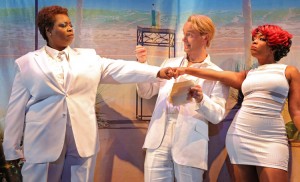Some excellent performances give buoyance to Robert O’Hara’s Bootycandy, a comic series of vignettes that are awkwardly interrelated but provide plenty of laughs as well as fodder for thought. The story follows a young black gay man from his troubled childhood through to adulthood, as if in snapshots.
Phillip James Brannon plays Sutter, the son of a flashily dressed single mother (Jessica Frances Dukes) who has little patience for his childish questions about words such as “period” and “bootycandy.” (She explains the slang term as “the candy for the booty,” i.e., a penis). In Brannon’s strong, well-modulated performance, one can detect the seeds of shyness that continue into adolescence, when he has an obsession with Michael Jackson, including dressing like him. When Sutter tries to tell his family that a strange man has followed him home, his mother (now played by Benja Kay Thomas), as self-involved as ever, doesn’t believe him and even disturbingly suggests "you musta done something" to attract the man's attention. She and his stepfather ban him from school musicals and urge him to take up sports as a solution. “Kung fu,” recommends Lance Coadie Williams’s uninterested parent.
Though his parents can't understand him, the unhappy Sutter reaches adulthood as a confidently gay man, aloof but with a quiet strength that belies his indifferent upbringing. Bootycandy, however, also includes scenes that seemingly have no relation to Sutter — a preacher (Williams) who announces to his congregation with wild flamboyance that he’s gay; a lesbian “divorce” ceremony that’s silly and a little stale; and a phone conversation among four black women (two each played by Dukes and Thomas) who are costumed with cleverness by Clint Ramos.
O’Hara, who directed and is himself black and gay, has no qualms about satirizing the bizarre names some black parents give their children, nor about employing the drawling caricatures that once characterized shows like Amos 'n' Andy. If anything, the drawls are broader here. An older black woman on the telephone berates her daughter for naming her grandchild Genitalia: “How you gon go n name that chile genitalia fool?” The daughter in the sketch (Dukes, who excels at embodying dim-wittedness) sounds like a female Stepin Fetchit, but the effect cheerily gives the raspberry to political correctness. The scenes, although imparting a choppy feel to the play, serve to identify the social milieu surrounding Sutter.
There is darkness, however. Eventually, in the second half, we learn more about the hero. Sutter’s close friend is Larry (Williams), and in a bar one night they pick up a straight white man eager for gay sex. There’s a horrific twist in which O’Hara shows us the profound damage created by Sutter's upbringing, and how reverse racism simmers. The only person Sutter can relate to, the only one who has ever encouraged him in his adoration of Michael Jackson, is his aged grandmother who raised him and now lives in a nursing home; but even she wants a bribe before she “recognizes” who he is.
Unfortunately, Bootycandy sometimes indulges in meta-theatrical antics. In Act I, a white moderator (Jesse Pennington), assembles a panel of five black playwrights on the stage of Playwrights Horizons. O’Hara’s premise is that the five playlets we’ve witnessed are the works of the quartet, but the gag strains to make us believe that the playwrights don’t really know why they’re appearing in the panel discussion or what the topic is.
In Act II, after a tense sequence, the actors rebel against the playwright/actor Sutter, and the fourth wall is again knocked down. There are hints of autobiography in Bootycandy (the moderator asks a black playwright how she got the surname O'Malley, and she answers, "Slavery"), but O'Hara hasn't transformed all of them coherently into a whole; there's a ramshackle feel to the work. Still, there’s no question that he's a playwright worth watching.
Bootycandy runs through Oct. 12 at Playwrights Horizons (416 West 42nd St. between 9th and 10th Aves.). Evening performances of Bootycandy are Tuesday and Wednesday at 7 p.m.; Thursday through Saturday at 8 p.m.; and Sunday at 7:30 p.m. Matinees are at 2:30 p.m. Saturday and Sunday. Tickets start at $75 and are available by calling 212-279-4200 or visiting www.playwrightshorizons.org.



